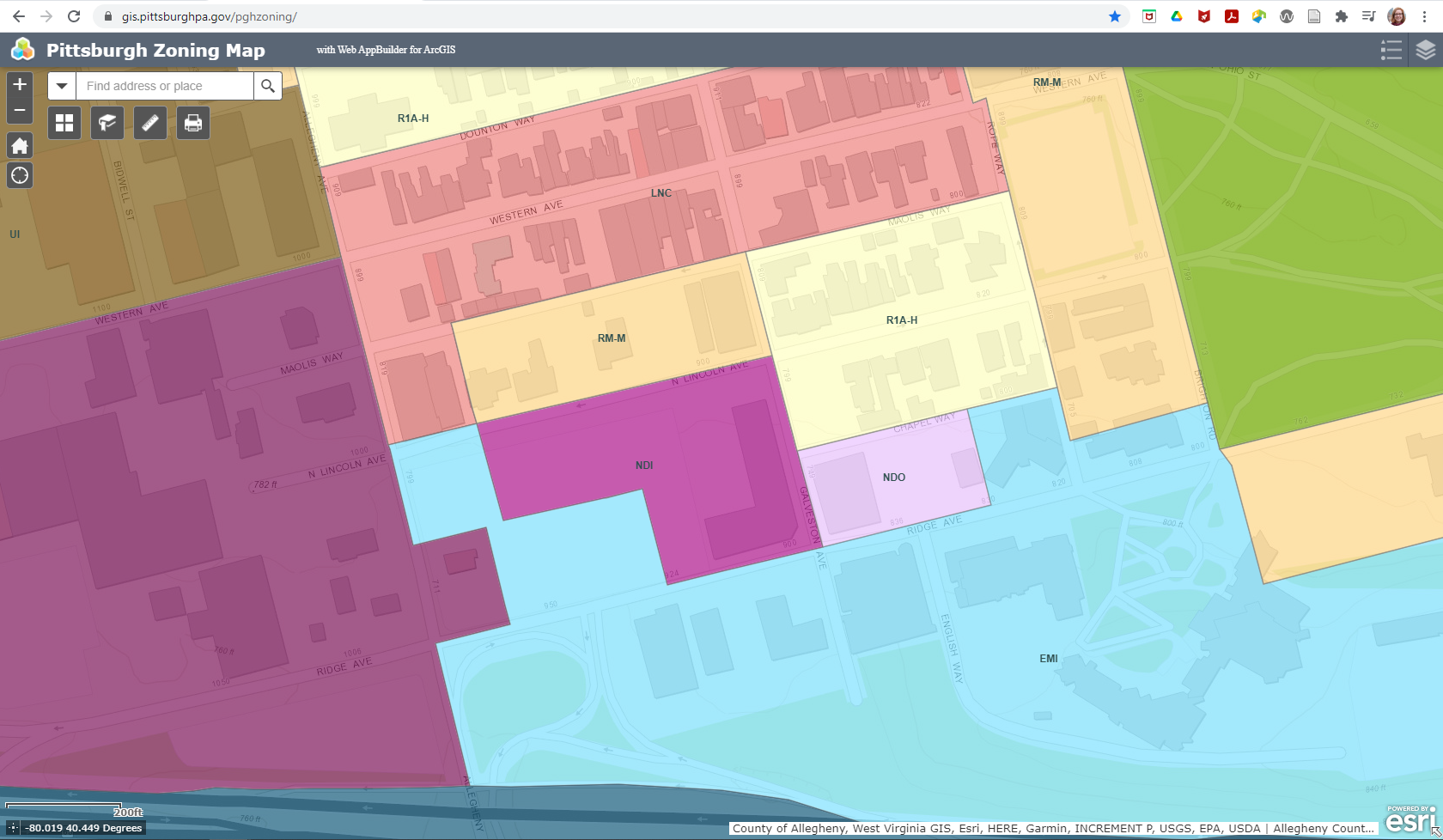Pittsburgh Zoning Districts - NDI Uses
By Carolyn Ristau
Uses
Zoning districts regulate what uses are permitted through what approval paths. Any use not listed in the following four categories below would require a use variance from the zoning board to proceed, unless the zoning administrator determines it is a use-not-listed that can be reviewed by staff.
As of March 2025, the online version of the use table identifies the following uses as allowable in the NDI (Neighborhood Industrial) zoning district. Note: Whenever there is a code amendment it often takes months for the online version to be updated. Zoning staff have access to the most recent code amendments, which can also be found on the city’s online legislation center.
Permitted-by-Right (P)
Uses that are permitted-by-right are designated by a P in the use table. These uses can be approved administratively by staff and were often referred to as “over-the-counter” under the in-person, paper submittal process. (As this is Pittsburgh, the phrase will likely stick for some time even now that the online submittal process has essentially done away with the counter.)
Note: Permitted-by-right is permitted only provided that all applicable zoning code regulations are met, not just the use standards.
Single-Unit Detached Residential
Single-Unit Attached Residential
Two-Unit Residential
Three-Unit Residential
Multi-Unit Residential
Multi-Suite Residential (Limited)
Agriculture (Limited & General)
Agriculture (Limited) with Beekeeping
Animal Care (Limited)
Art or Music Studio
Bank or Financial Institution (Limited & General)
Bed and Breakfast (Limited & General)
Child Care (Limited & General)
Club (Limited)
Community Center (Limited & General)
Cultural Service (Limited)
Laboratory/Research Services (Limited)
Library (Limited & General)
Medical Marijuana Dispensary
Medical Marijuana Growing and Processing
Medical Office/Clinic (Limited)
Nursery, Retail (Limited)
Office (Limited)
Parks and Recreation (Limited)
Recreation and Entertainment, Indoor (Limited)
Religious Assembly (Limited & General)
Restaurant (Limited)
Retail Sales and Service (Limited)
Retail Sales and Services, Residential Convenience
Vocational School (Limited)
Administrator Exception (A)
Uses that are permitted through the administrator exception process are designated by an A in the use table. The administrator exception process is reviewed by staff but involves a posted notice on the property and additional fees. It usually requires more documentation than the permitted-by-right process.
Assisted Living Class A
Housing for the Elderly (Limited)
Multi-Suite Residential (General)
Personal Care Residence (Small)
Car Wash
Communication Tower, Class A
Construction Contractor (Limited)
Grocery Store (Limited)
Hotel/Motel (Limited)
Laboratory/Research Services (General)
Manufacturing and Assembly (Limited)
Medical Office/Clinic (General)
Nursery, Retail (General)
Office (General)
Parking Commercial (Limited)
Recreation and Entertainment Outdoor (General)
Recycling Collection Station
Retail Sales and Service (General)
Safety Service
Utility (Limited)
Vehicle/Equipment Sales (Limited)
Warehouse (Limited)
Special Exception (S)
Uses that are permitted through the special exception process are designated by an S in the use table. The special exception process is reviewed by the Zoning Board of Adjustment and involves a posted notice, public hearing, and additional fees. For each special exception, there are specific criteria listed in the zoning code that must be met before the zoning board can approve the proposal.
Assisted Living Class B & C
Community Home
Housing for the Elderly (General)
Personal Care Residence (Large)
Public Assembly (Limited)
Check Cashing
Club (General)
Communication Tower, Class B
Cultural Services (General)
Educational Classroom Space (Limited)
Firearms Business Establishment
Forestry Activities
Funeral Home
Grocery Store (General)
Helistop
Hotel/Motel (General)
Laundry Services
Manufacturing and Assembly (General)
Parking Commercial (General)
Parking Structure (Limited & General)
Recreation and Entertainment, Indoor (General)
Recreation and Entertainment, Outdoor (Limited)
Restaurant (General)
School, Elementary or Secondary (Limited & General)
Service Station
Vehicle/Equipment Repair (Limited & General)
Vehicle/Equipment Sales (General)
Vocational School (General)
Warehouse, Residential Storage
Welding or Machine Shop
Conditional Use (C)
Uses that are permitted through the conditional use process are designated by a C in the use table. The conditional use process is reviewed by the Planning Commission, which then makes a recommendation to City Council which is the approving body. There are multiple posted notices, multiple public hearings, and additional fees.
Communication Tower, Class C
Controlled Substance Dispensation Facility
Correctional Facility (Limited)
Custodial Care Facility
Excavation/Grading/Fill, Major
Helipad
Transit Facility
Utility (General)
For Additional Information:
See our overview of the NDI for more about this district and our Introduction to Pittsburgh’s Zoning Districts for the complete list of base zoning districts in the city.

